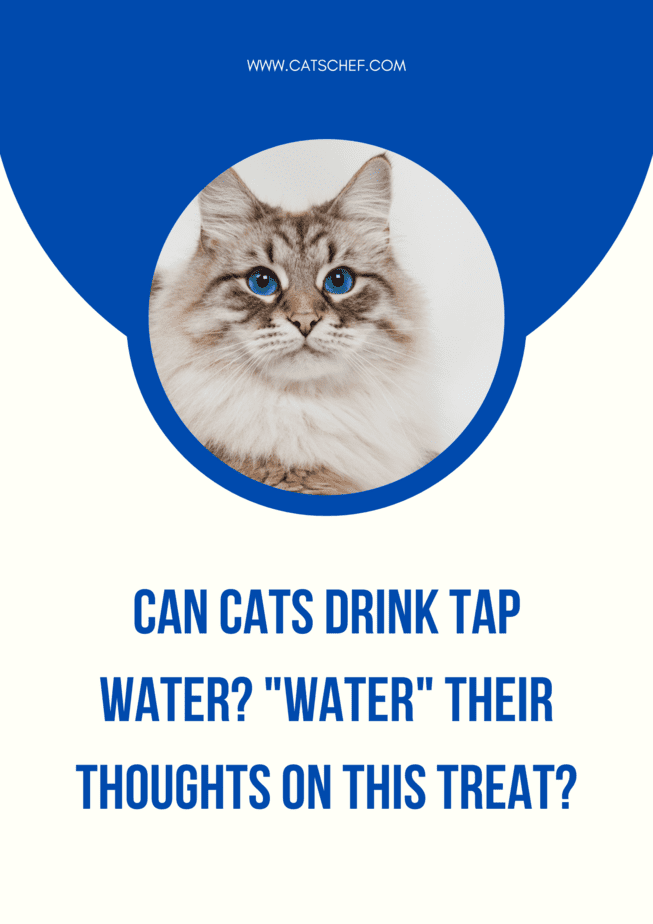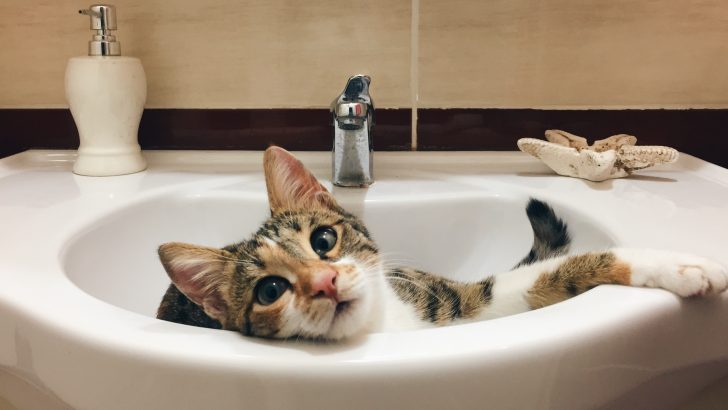“Come on, cats hate water! Why do you have to be the one that doesn’t want to get out of the sink? Why do you have to be the one that waits for the water to splish splash all over your face while you’re trying to have a lick?!” Cats are the worst, aren’t they (we’re being sarcastic OFC)? But, can cats drink tap water?
You never thought you’d have to wait for your cat to finish playing IN THE SINK before you can brush your teeth in the morning. You’re pretty sure she’s out of this world because you’ve never heard of anything like that before you adopted her (or she adopted you, might have been a mutual thing).
Our curious creatures need water as much as we do, and we drink tap water every day without batting an eye. Or least those of us who aren’t Kylie Jenner and can’t afford a fridge filled with Perrier, Evian, and Fiji. Or those of us who have better things to do than to spend our money on overpriced bottled water.
Anyway, your precious purrincess doesn’t mind the tap whatsoever. You’re worried she would spend the entire day soaking her little paws, wetting her nifty nose, and hydrating her little heart out.
You’re pretty sure she’s convinced everyone in the house that the sink’s her gain drinking bowl. But, can she drink tap water?
Cats can drink tap water as long as humans can drink the same tap water, too. Certain types of tap water (or certain sources) aren’t even safe for human consumption and they wouldn’t be safe for feline consumption. We’re bringing you everything you need to know as a cat parent.
Why does drinking water matter to your cat?
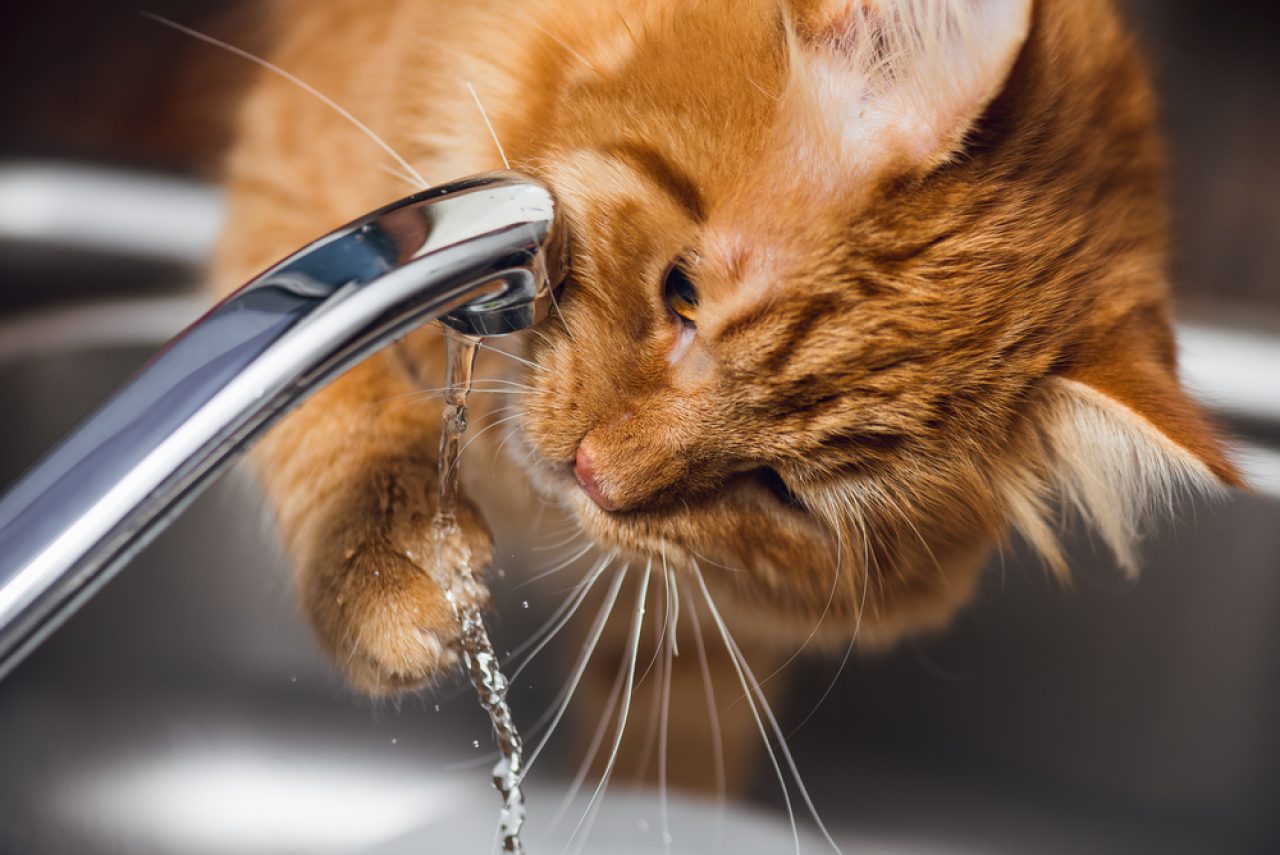
Cats need water as much as we do – drinking enough water on a day-to-day basis prevents diseases, keeps their energy levels up, regulates their body temperature levels, helps digest food and filter out waste, and speeds up their recovery.
But, cats are notoriously bad water drinkers. They can actually TASTE the water – regardless of what your middle school teacher told you about water not having a taste. They have the necessary taste receptors that help them detect and taste the water that they’re drinking, on the off chance that they’re drinking it at all.
You see, cats prefer munching on cat foods and cat treats. You might notice that your little munchkin gets really, really excited whenever you feed her wet foods. Much more than when serving foods on the drier side. And, you might notice she drinks even less water on days when she’s throwing a wet food feast.
That’s because most cats regulate and maintain their hydration levels through wet foods, wet treats, and other sources of water that need chewing. Most cats hate drinking out of their drinking bowls because they simply prefer moving water (which has something to do with their ancestors).
That’s a problem because cats need one ounce of water for each pound of body weight (as recommended by our friends over at the ASPCA – American Society for the Prevention of Cruelty to Animals). That’s why cats can easily become dehydrated, which is a problem on its own.
Some of the most common symptoms of dehydration are weakness, depression, sunken eyes, loss of appetite, and dry mouth. Contact your vet the moment that you notice any of these symptoms. Give her some fresh, clean water to drink, and don’t panic.
She should be back to her normal, energetic self before you can even utter “Drink!”
Can cats drink tap water?
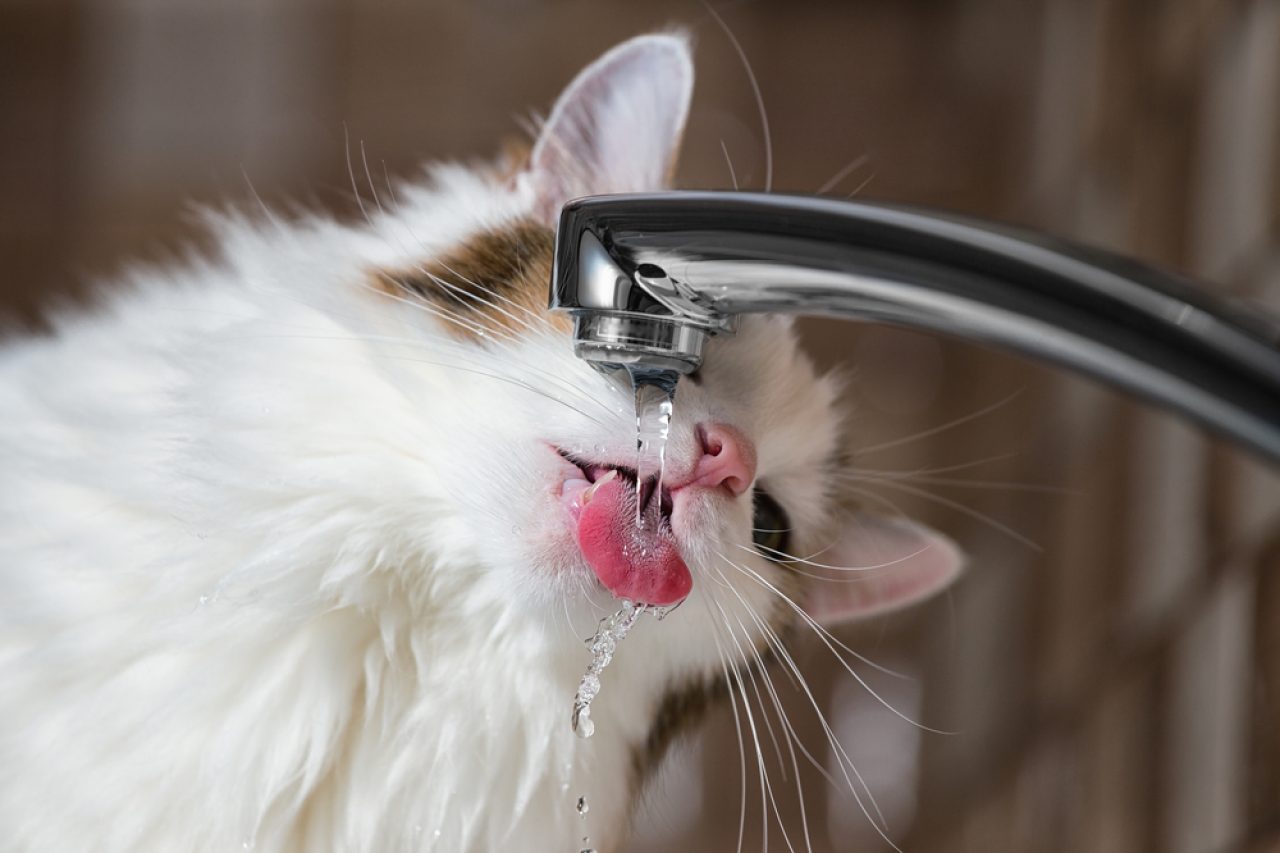
Now that we brushed up on our knowledge about hydration, we can move on to what you came here for – can cats drink tap water? But, like with everything else related to your mischievous monster, there can’t be a black or white answer.
Cats can drink tap water, but there are a couple of things to keep an eye out for. The general rule of the thumb is that you can give your cat a little bit of tap water as long as you can drink a little, too. The type of tap water that isn’t safe for you (aka, a human), isn’t going to be safe for your cat.
“But, why do we have to be so meticulous about water? When they’re in the wilderness, cats don’t look for filtered or bottled water, they take whatever they can get!”
That’s true, but your precious purrincess isn’t in the wilderness, is she? She’s in the living room, lounging on your sofa, and waiting for her bottle of Perrier, isn’t she?
And even if she was in the wilderness, she wouldn’t have a hard time finding a source of water that’s good enough for her standards. She’s a wild animal (regardless of how innocent she looks while she’s purring and sleeping next to your leg), and she possesses instincts that tell her which type of water’s safe.
That’s the very reason why cats prefer moving water – they can sense the chemicals and contaminants, and they choose to look for the source of water they deem the cleanest and the freshest. The water that doesn’t move seems more likely to contain bacteria, parasites, and other pesky passengers.
What to keep an eye out for when letting your cat drink tap water?
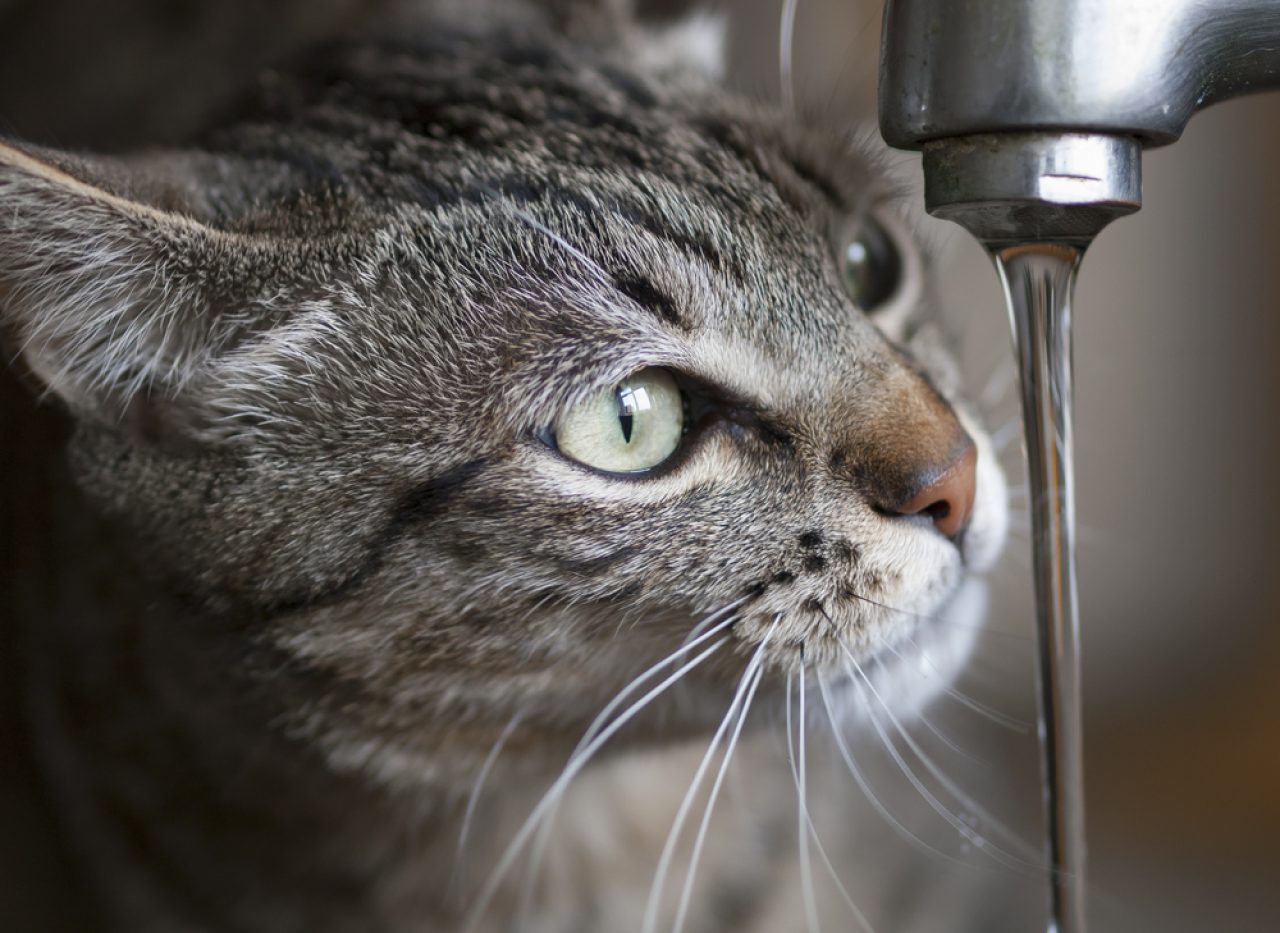
Cats can drink tap water. But, that’s not to say that you can let her drink her little heart out while you’re minding your business. You need to make sure the tap water you’re letting your cat drink doesn’t contain chemicals and contaminants that can cause harm to her health.
Your cat’s digestive system seems pretty simple, but it’s much different from yours. She doesn’t possess the enzymes necessary to break down and process A LOT OF the things that you eat and drink on a regular.
While the tap water that you drink shouldn’t be unsafe for your cat, you’re better off consulting with a professional. But before you head off to a different page to look for professionals, take a look at some of the most common chemicals and contaminants to keep an eye out for.
1. Flouride
“Cats can drink tap water, but they can’t have fluoride? What?” That’s the thing with cats – you can never be too cautious when you’re considering their safety. Fluoride that’s typically found within tap water can’t cause harm to your cat unless she consumes A LOT of water at once.
Fluoride’s a mineral that’s added to tap water to prevent tooth decay – which sounds great for your feline friend (she could use more of those tooth brushing activities). And worry not, because fluoride shouldn’t be detrimental to your or your feline’s health.
We say shouldn’t because fluoride CAN be problematic when consumed excessively. But, your cat isn’t likely to drink the amount of water necessary for the fluoride to cause harm. She’s more likely to experience fluoride poisoning from other sources – toothpaste, mouthwash, and even certain foods.
Consult with your vet and keep an eye out for the most common symptoms of fluoride poisoning. Drooling, watery eyes, runny nose, weakness, depression, stiffness, restlessness, loss of appetite, vomiting, diarrhea, and even convulsions are the ones to take notice of.
2. Chlorine
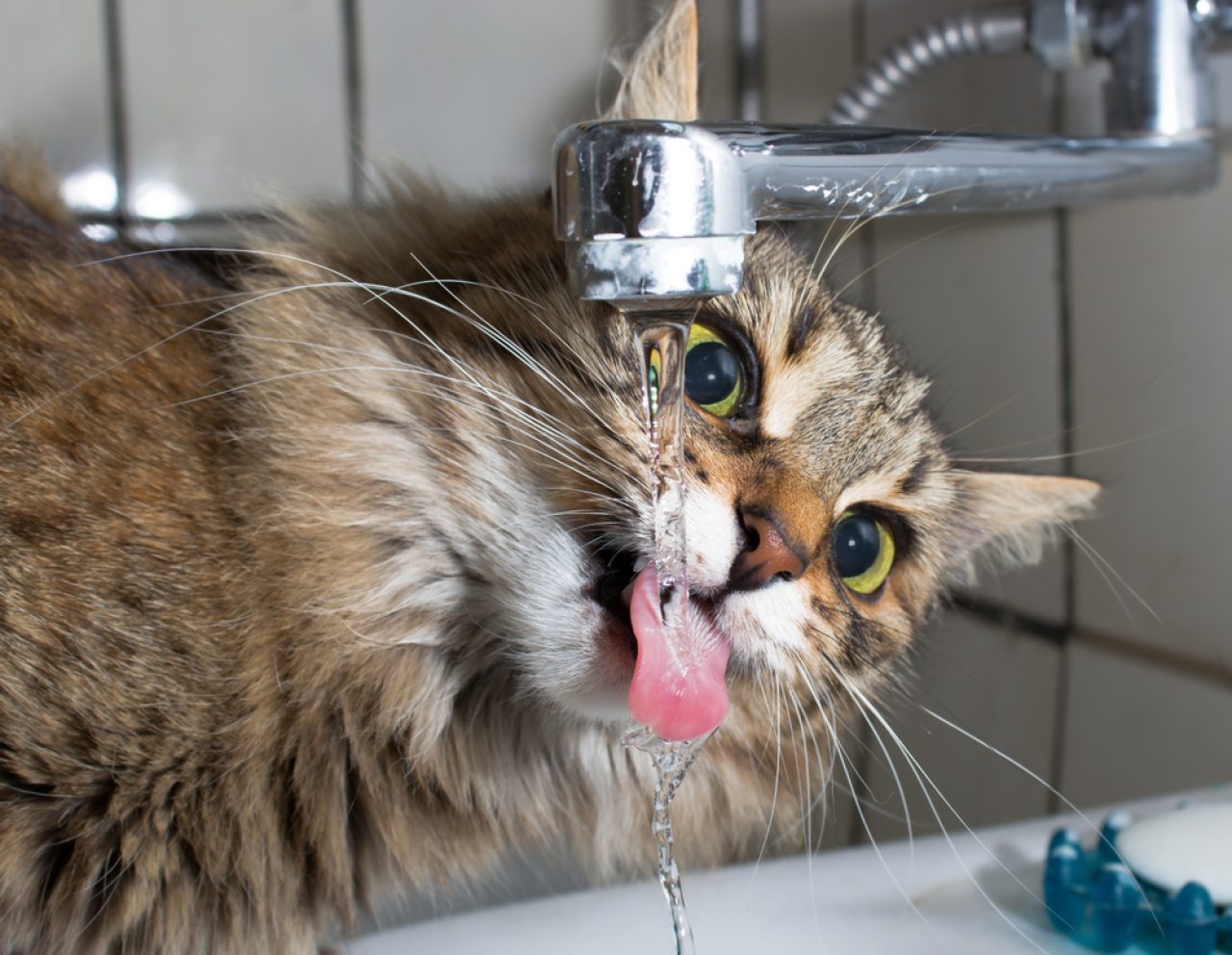
“Wait, cats can drink tap water but they can’t have chlorine? Can they even swim in the pool?!” Hold your horses, your little munchkin shouldn’t experience anything out of the ordinary from a little bit of chlorine water. But… There’s always a but somewhere in there.
Chlorine’s a chemical that’s typically added to water to kill parasites and bacteria. That sounds great for your don’t-let-the-bugs-bite-me cat. But, that also makes you wonder whether this chemical can harm your cat’s digestive system.
Chlorine can actually cause a tummy ache or even send her running to her litterbox. But, only when we’re talking about higher levels of chlorine. Tap water doesn’t typically contain the amount of chlorine necessary to break her out into hives and rashes. That’s something to keep you on your toes, though.
But, we can’t forget about the fact that cats don’t even like chlorine! This chemical can make your cat retch and gag the moment that she catches a whiff. It can happen while she’s running around the pool or cooling off in the sink. Consult with your vet before you make her go through such an ordeal.
3. Other minerals (calcium, magnesium, and iron)
Tap water can contain A BUNCH of things – you can never know what you’re getting yourself and your feline friend into. Minerals such as calcium, magnesium, and iron are (to a great degree) found within hard tap water (more on that a bit later in the article).
Calcium, magnesium, and iron are essential minerals that can bring a bunch of benefits to your cat’s table. Tap water that contains these minerals shouldn’t cause harm to your cat – as long as she doesn’t drink an entire pint. Excessive amounts of either of these minerals can cause health problems.
Calcium and magnesium can cause urinary diseases (for instance, the formation of crystals in your cat’s bladder), and iron can cause digestive problems, loss of appetite, and low blood pressure. Remember – there’s nothing wrong with minerals as long as she doesn’t overconsume them.
4. Lead
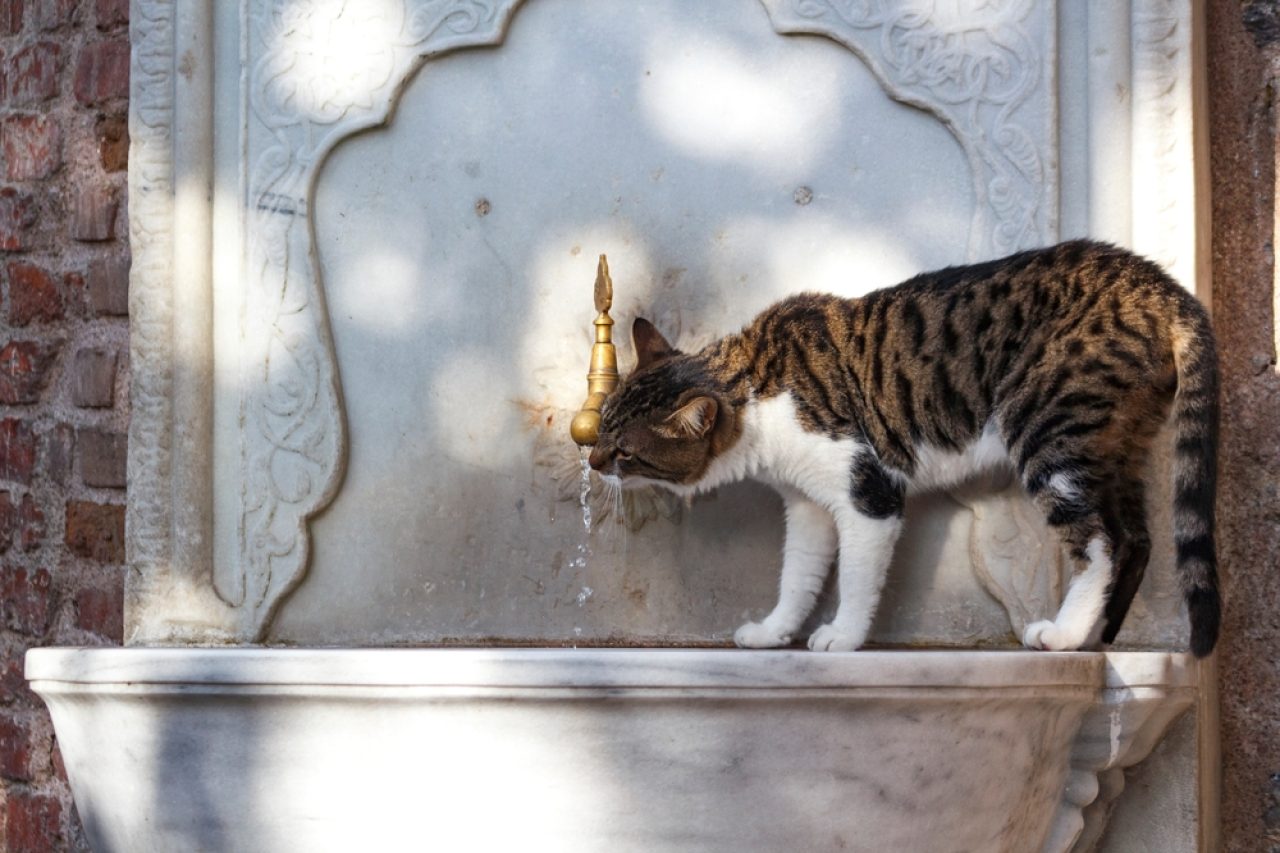
“Cats can drink tap water, but you’re telling me that there could be lead somewhere in there?” Now we’re marching into the territory of things that could POSSIBLY go wrong when you’re letting your cat drink tap water.
While fluoride, chlorine, and other minerals can be pretty much everywhere, lead’s not that popular.
So, how exactly does lead end up in your tap water? Some homes have lead pipes that connect to the main source of water. These pipes can corrode over time (especially when they’re not taken care of) and cause lead particles to end up in your tap water.
Lead can actually cause harm to humans, cats, and dogs when they’re exposed to levels that are high enough. Lead particles from your corroded pipes shouldn’t cause that much harm. But, they can accumulate over time and lead to health problems.
So, you might want to pay closer attention to your little munchkin while she’s munchin’ on that tap water.
5. Ammonia
“Wait, what?! There’s ammonia in tap water that my cat can supposedly drink?!” Ammonia’s pretty much everywhere you look – it’s particularly prevalent in areas that use fertilizers, and chemicals, and deal with animal waste. And, low levels of ammonia can find their way into your tap water.
Such low levels don’t seem to be a problem, at least not according to World Health Organization (WHO). Your tap water would need to be contaminated with higher levels of ammonia to cause any lasting damage. The same thing goes for your four-legged friend.
Don’t even get me started on the fact that cats HATE the scent of ammonia, and they can sense that from miles away. Don’t worry, your furry friend isn’t that likely to drink the water that’s been contaminated with higher levels of this chemical.
6. The difference between hard and soft water
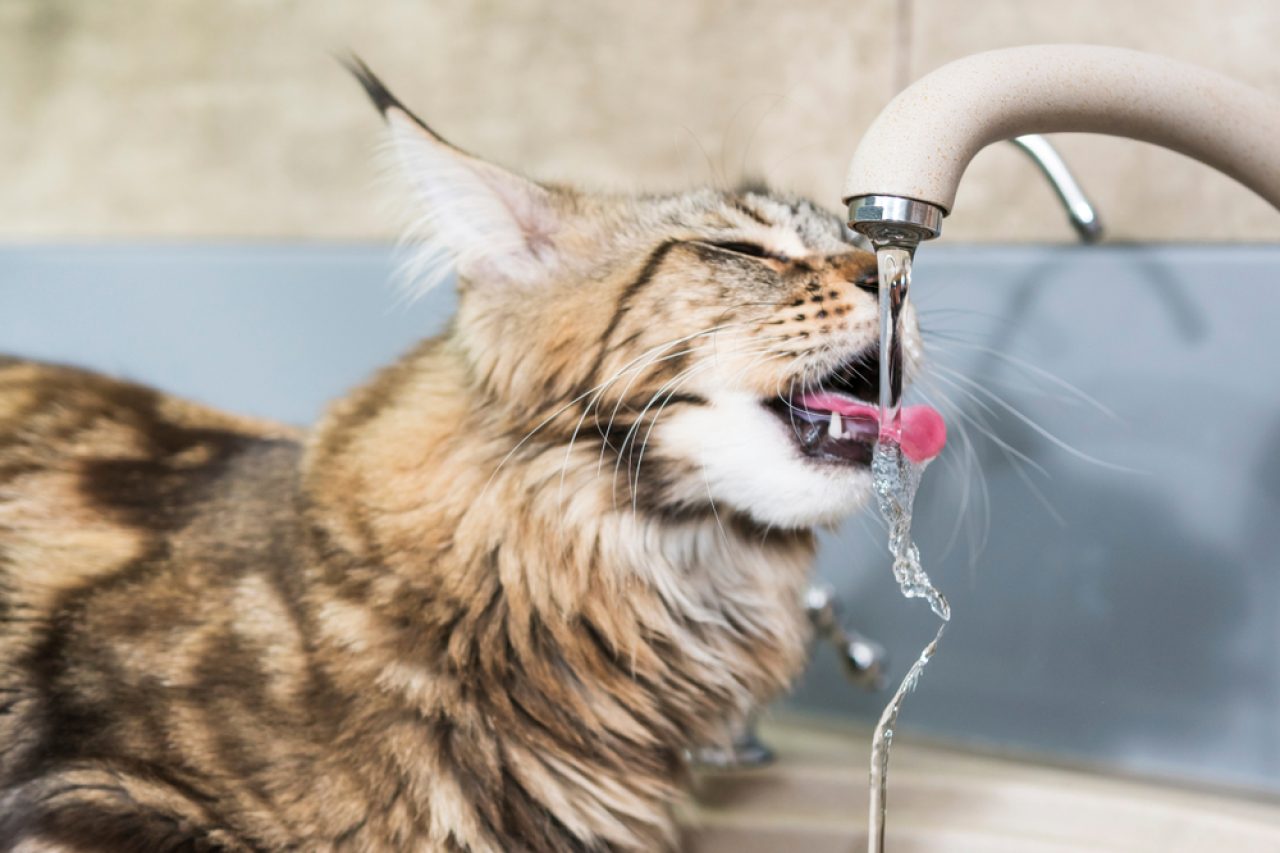
Here’s the thing – most of the minerals we’ve mentioned reside within hard water. “What the heck is hard water?” Bear with me because water CAN actually be hard. Soft, slightly hard, moderately hard, hard, very hard, and extremely hard, to be particular.
The easiest definite of what we’re talking about would be this – the hardness of the water indicates the levels of minerals that water possesses. Extremely hard water possesses the highest amount of minerals, while soft water possesses the least amount.
A water softener actually removes the hard minerals from your tap water and replaces them with sodium ions. This makes the water more or less salty depending on the hardness. And, if your tap isn’t suitable for your cat (for whatever reason) you can consider trying out a different alternative such as water softeners.
Why does your cat like drinking tap water?
What have we learned so far? Cats can drink tap water. But, tap water may or may not contain chemicals and compounds that can harm your cat’s health. When you’re safe to drink your tap water, you can also share some with your cat that’s obsessed with drinking straight from the faucet.
Why does your cat like drinking tap water? There could actually be a couple of reasons for that – the first one being that she’s seen you drink tap water on more than one occasion. She’s curious to see what the hype’s about and she’s happy to drink whatever you’re drinking.
On the other hand, tap water can contain certain compounds that can change the flavor. She might be drawn to that type of water because she prefers the taste. She might be getting bored with the one you pour into her drinking bowl every single day.
And, let’s not forget about the fact that cats prefer moving water. There’s this thing where their ancestors used their senses to figure out which water was contaminated. The moving water was typically the one that was the cleanest and the freshest. What can we say – your cat REALLY loves her tap water!
How to stop your cat from drinking tap water?
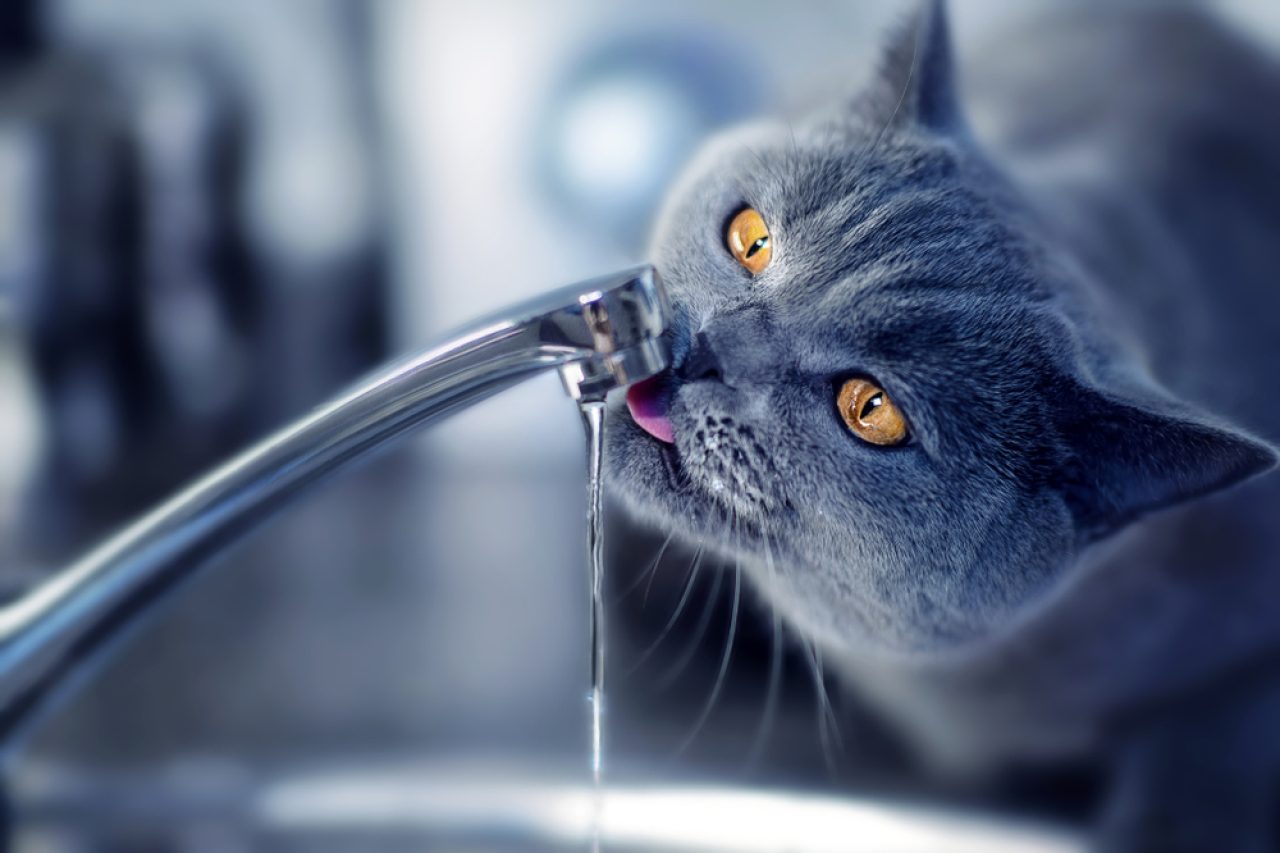
Okay, the answer to the question “Can cats drink tap water” is Yes, but your tap water might be contaminated. You don’t want your little munchkin sipping on something that could send her to the emergency animal center.
So, how do you stop her from drinking tap water? She doesn’t even want to give you the time of the day!
Make sure she always has access to clean, fresh water. Cats (like humans) don’t like drinking out of something that’s been sitting in the sun for hours. And, trust me, they don’t like drinking something that’s been contaminated with dust particles, bacteria, and parasites.
Consider purchasing a water fountain for pets. That’s a great way for you to prove her with moving water without having to figure out a way to move closer to a stream or a river. Water fountains are also great at solving the problem we mentioned beforehand. They always provide your cat with clean, fresh water.
Get a water filter. What better way to stop your cat from drinking contaminated tap water than to purchase something that can clean it for you? Make sure you consult with a professional (and even conduct your own research) before you make any purchases, though.
Can cats drink bottled water?
Cats can drink bottled water! But, this one’s got a but attached because bottled water can contain compounds that are poisonous to cats. We’re mainly talking about the particles of plastic that can get inside your cat’s digestive system because of a poor-quality bottle.
These particles can actually cause glandular disruption and thyroid problems. They can also accumulate within your cat’s digestive system over time and cause serious health problems.
You might be thinking that you’re giving your cat the royal treatment with Perrier, Evian, and Fiji (not that their bottles contain particles of plastic). But, she’s better off sticking with filtered tap water.
Can cats drink electrolyte water?
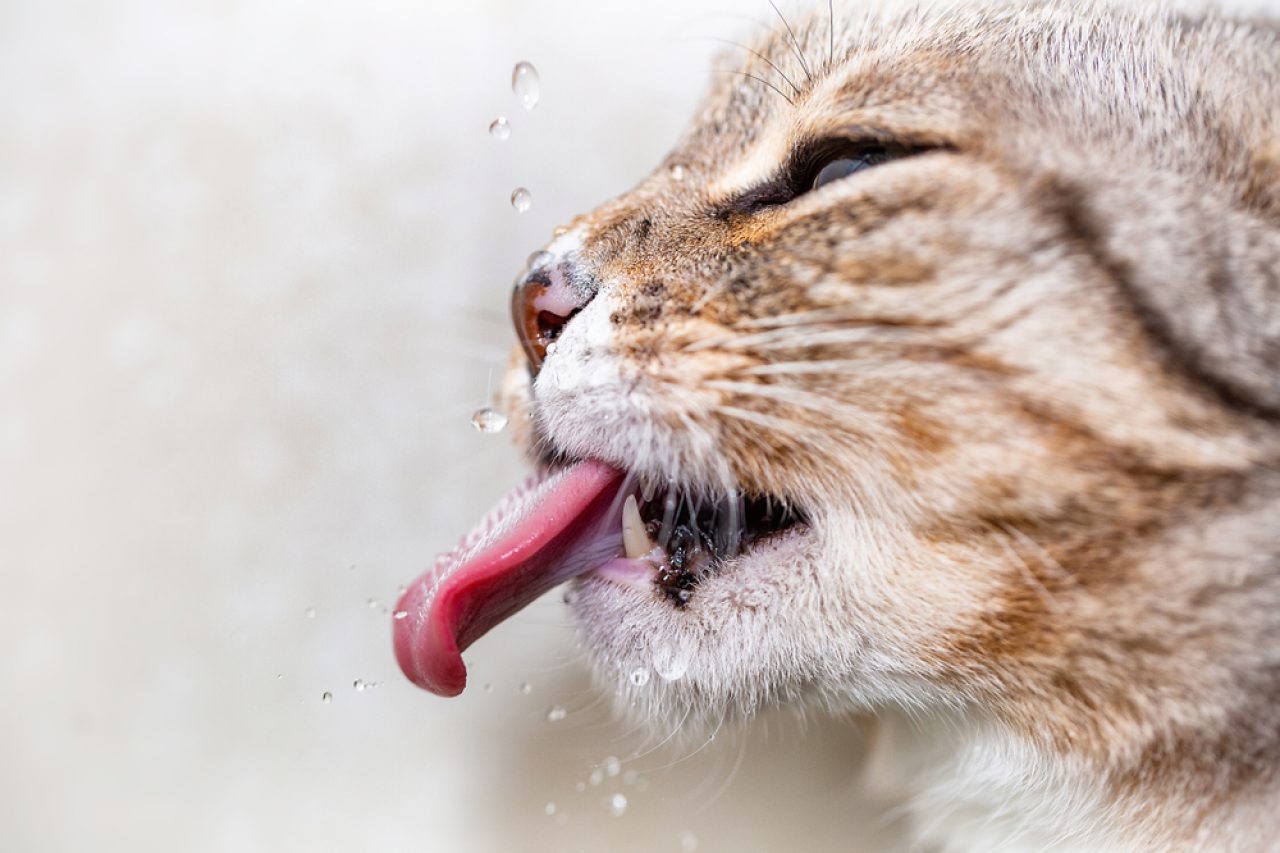
Cats can drink electrolyte water – but not without a green light from your vet. Your cat doesn’t really need to drink electrolyte water unless she’s already dehydrated.
Cats can be really fussy about drinking water which means they’re pretty susceptible to becoming dehydrated. Your cat doesn’t need to drink electrolyte water while she’s going about her day, minding her own business – and even when she does, she shouldn’t experience adverse reactions.
But, the moment that she starts showing symptoms of dehydration she might need a quick pick-me-up in form of electrolyte water. Contact your vet and make sure you’re using the right type of electrolyte water. Your cat should be as good as new!
Can cats drink alkaline water?
Cats can drink alkaline water – but again, only when your vet gives you the thumbs up. Alkaline water can be bad for your cat under certain circumstances, so you’re better off following the doctor’s orders.
Avoid giving your cat alkaline water while she’s eating because this type of water can neutralize the acids in her belly that help the process of digestion. Other than that, avoid giving alkaline water to your cat when she’s nursing or when she’s using medication.
Can cats drink sparkling water?
Cats can drink sparkling water – kind of! Sparkling water doesn’t contain anything that could cause harm to your cat. But, that’s not to say that sparkling water’s the perfect source of hydration for your little munchkin.
Drinking sparkling water can cause bloating, nausea, and a bunch of digestive problems for cats with sensitive stomachs. Cats aren’t that great at managing their portions. Or stopping themselves when they feel they’re getting full. Or even choosing the right type of water that won’t send them to the vet’s office.
Your cat can take a little bit of sparkling water. But, keep a close eye on her so she doesn’t scoff down the entire glass.
Can cats drink ice water?
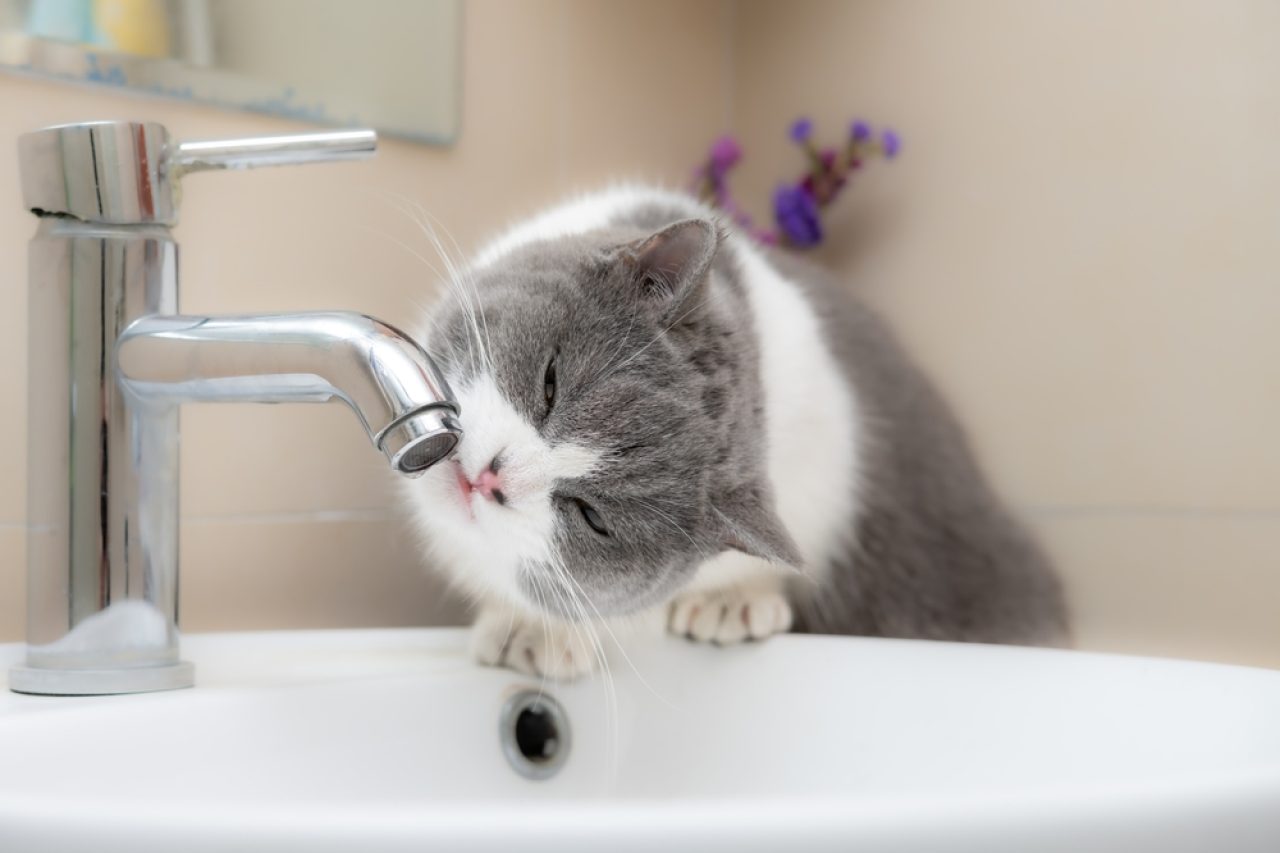
Cats can drink ice water – and there are no buts here! Your feisty feline’s more likely to drink water with a couple of ice cubes. She probably doesn’t like the taste of room-temperature water (she sure likes her water clean, fresh, and moving). And, she’s more than likely to enjoy playing with ice cubes.
This type of water can even encourage her to drink more. She can keep her hydration levels higher than ever and keep herself happy and healthy. And, who doesn’t like playing with their food (or drink, in this case)?!
Can cats drink flavored water?
Cats can’t drink flavored water – and we’re ending on a negative note! Flavored water’s beaming with sugar, sweeteners, and preservatives that can cause harm to your cat. Not to mention the fact that flavored water can be flavored with fruits that aren’t safe for felines (cherries, maybe?).
But, you can always bring back that smile on your cat’s face with homemade flavored water. Blueberries, strawberries, peaches, and even bananas can make for a mouth-watering mocktail for you and your feline friend. What’s stopping you?!
